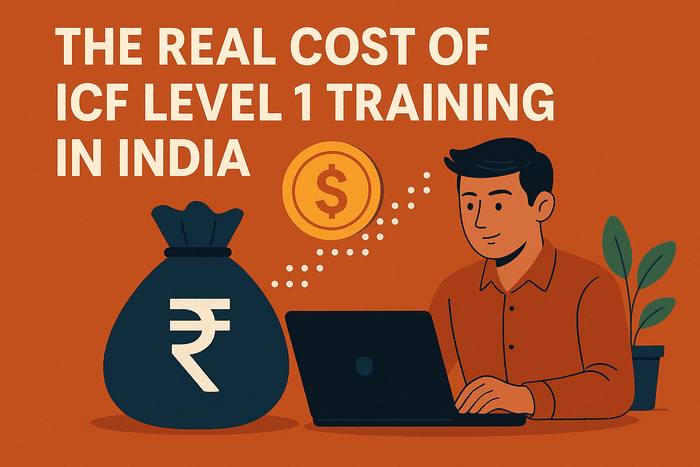
When prospective coaches research training options, cost is often the first number they look for. A quick internet search produces...
Level 1 certification, which leads to the Associate Certified Coach (ACC) credential, requires at least 60 hours of coach-specific training and 100 hours of coaching experience. It emphasises foundational skills, ethics and competency. The question for aspiring coaches is therefore not “How cheap can my training be?” but “What investment will build credibility and earn a return over the long term?”
ICF Level 1 certification is the first formal stage in the coaching credentialing pathway. It focuses on the core competencies necessary to establish trust with clients, listen actively, ask powerful questions and facilitate action. Candidates learn to craft coaching agreements, create psychological safety and understand the ethical considerations of working with clients. According to the ICF’s competency framework, training should cover eight core competencies: demonstrating ethical practice, embodying a coaching mindset, establishing agreements, cultivating trust and safety, maintaining presence, listening actively, evoking awareness, and facilitating growth. Level 1 programmes also include practice coaching sessions under supervision, allowing learners to integrate theory with real client conversations. These supervised hours are vital: without feedback from experienced mentors, novices may unintentionally reinforce bad habits or ethical blind spots.
The certification process culminates in a knowledge assessment and a performance evaluation. Candidates must demonstrate competency in coaching conversations and show that they can apply the ICF’s ethical code. Only after meeting these requirements and logging the required practice hours can a candidate apply for the ACC credential. This rigorous process ensures that certified coaches have a baseline level of skill and accountability. While some online courses mimic ICF curriculum or claim to be “aligned” with ICF, only officially accredited programmes count toward the credential. Investing in a legitimate Level 1 programme is therefore essential if one intends to acquire a recognised credential.

In India, the price of ICF Level 1 programmes varies widely. On the low end, some providers charge around INR 50,000 for short online courses, while established providers may charge INR 1.5–2 lakhs (US$1,800–2,400) for comprehensive training. At first glance, the price difference appears stark. Low-cost courses often minimise contact hours, provide little mentoring and offer limited feedback on your coaching performance. They may recycle generic materials or rely solely on self-study modules, leaving learners to figure out how to apply concepts in real conversations. Such programmes might deliver a certificate of completion, but without official accreditation they do not count toward the ACC credential and cannot be used to apply for ICF membership. A certificate without recognition is effectively a piece of paper.
By contrast, accredited programmes structure training across several weeks or months. Participants attend live classes (either in person or online), engage in practice coaching with peers, receive mentor feedback and complete assignments. The price includes mentor coaching sessions, performance evaluations and often lifetime access to course materials. These programmes may also offer value-added elements such as alumni networks, job acceleration masterclasses or supplementary technology certifications. The initial investment is higher, but the return is substantial: you earn a credential that signals professionalism and opens the door to corporate clients, higher fees and international opportunities. When evaluating cost, consider the training hours provided, the reputation of the provider and the additional support offered. Cheap training may save money upfront but could limit your credibility and earnings in the long run.
Low-priced coaching courses rarely mention the hidden costs associated with inadequate training. First, if the course is not accredited, you will still need to complete 60 hours of accredited training and 100 hours of coaching practice to qualify for ACC. This means paying for additional training later, which could end up costing more than choosing a legitimate programme from the start. Second, cheap courses often forgo mentor coaching or provide minimal feedback, meaning learners may develop bad habits that need to be unlearned. Without proper supervision, there is also a risk of inadvertently breaching ethical guidelines—something that can damage your reputation.
Another hidden cost is lost opportunity. Coaching clients want results and are willing to pay for quality. A poorly trained coach may struggle to attract clients or deliver transformative outcomes. As the ICHARS article on coaching benefits notes, well-trained coaches help clients build self-confidence, gain clarity and improve relationships. If clients feel unsatisfied due to subpar coaching, they will not refer others, and negative reviews may spread quickly. Additionally, corporate clients, particularly multinational firms, often require coaches to hold ICF credentials. Without these credentials, you may miss out on lucrative corporate contracts, training engagements or leadership development programmes. In other words, skipping proper training could significantly limit your income and professional growth.
Certification directly influences your market credibility. In a crowded marketplace where only about 1.25 % of coaches on LinkedIn are credentialed, having an ACC credential differentiates you from untrained practitioners. Clients, especially those paying premium rates, want assurance that their coach follows an ethical code and has invested in professional development. A credential signals that you take coaching seriously, which builds trust. Furthermore, certified coaches can charge higher fees and command respect when marketing themselves to corporations or high-net-worth individuals. Data cited by Erickson indicates that 80 % of coaches believe clients expect them to be certified. For Indian coaches aspiring to international recognition, ICF credentials are essential because many organisations will only contract credentialed coaches.
Beyond credibility, proper training also equips you to deliver better results. Training programmes teach you to listen deeply, ask powerful questions and facilitate client awareness. As your skills improve, so do client outcomes—leading to referrals, repeat business and a strong reputation. Additionally, certification connects you to a global network of coaches, mentors and professional development opportunities. This network can be invaluable for finding clients, forming partnerships and continuing your education. The initial cost of Level 1 training is therefore better viewed as an investment that yields financial and professional dividends over time.
When evaluating Level 1 programmes, prioritise accreditation, mentorship and curriculum. Only select programmes that are officially ICF-accredited. Some providers mislabel their courses as “ICF aligned” without accreditation; these courses do not qualify for the ACC application and should be avoided. Check the provider’s accreditation status on the ICF website or ask for documentation. Next, investigate the quality of mentor coaching. Mentor coaches should ideally hold PCC or MCC credentials and have substantial coaching experience. Their feedback will help you develop your coaching style and avoid common pitfalls. Look for programmes that include at least ten hours of mentor coaching, as required by the ICF.
The curriculum should cover all core competencies, provide opportunities for practice and include ethical training. Programs like Erickson’s Art & Science of Coaching divide training into multiple modules, each focusing on different aspects of coaching such as solution-focused methodologies, advanced techniques, systems coaching and mastery. Ensure that your chosen course offers a balanced mix of theory, practice and reflection. Consider the format as well: some programmes are fully online, others are in person, and some offer hybrid models. Choose a format that suits your learning style and schedule. Finally, evaluate value-added services. Does the provider offer alumni networks, technology training or career support? These extras can enhance the long-term value of your investment.
A high-quality Level 1 programme yields dividends far beyond the certificate itself. Certified coaches report greater confidence, stronger coaching presence and improved client relationships. With training, coaches learn to embody a coaching mindset, maintaining curiosity and non-judgement even in challenging conversations. They also build a deeper understanding of ethics and boundaries. These competencies not only improve client outcomes but also reduce the risk of damaging ethical missteps. Accreditation also connects you to a community of peers and mentors who can provide support, share knowledge and collaborate on projects. Professional networks expand your horizons beyond the Indian market, allowing you to tap into global opportunities.
Financially, certification often leads to higher rates. Corporations and high-paying clients prefer credentialed coaches and are willing to pay more for proven quality. Many coaches recoup the cost of training within the first year of full-time practice. Moreover, accredited programmes often provide marketing resources, such as listing you on their alumni directories or offering guidance on creating a coaching practice. These resources help you accelerate business growth. A comprehensive investment analysis therefore reveals that spending on accredited training yields a positive return on investment through increased earnings, enhanced skills and professional credibility.
Consider the story of an HR professional in Mumbai who wanted to incorporate coaching into her role. She initially enrolled in a short, low-cost weekend course that promised instant certification. While she gained some basic insights, the course lacked structure, mentorship and accreditation. Unsure of her abilities, she hesitated to coach colleagues and never felt confident charging clients. Realising the limitations of this approach, she later invested in a comprehensive Level 1 programme offered by an ICF-accredited provider. Over several months she attended live classes, logged 100 hours of practice coaching and received personalised feedback from a mentor. Upon completing the programme, she earned her ACC credential and felt equipped to coach professionally. Within a year she was leading internal coaching initiatives and had started a side practice, earning far more than she ever imagined. The contrast between her two experiences underscores the difference between cheap training and accredited programmes: the former offers superficial knowledge, whereas the latter builds lasting competence and credibility.
Another example comes from a Bengaluru-based corporate trainer who transitioned into executive coaching. After completing 60 hours of training and 100 hours of practice in an accredited programme, he obtained the ACC credential. He then positioned himself as an executive coach and secured contracts with multinational companies. His clients reported improved team performance and engagement, and he increased his rates by 40 %. These success stories illustrate that investing in proper training yields tangible career benefits.
Understanding the real cost of Level 1 training goes beyond tuition fees; you must weigh the value of accreditation, mentor coaching and long‑term return on investment. As this article explains, low‑priced courses often lack accreditation, mentoring and practice hours, leaving you unprepared for the ACC credential. Once you appreciate why quality training pays dividends, it’s time to compare legitimate programs. Examine whether the course is officially ICF‑accredited, how many live contact hours it offers, whether mentor coaches hold PCC or MCC credentials, and what kind of alumni support is provided. Also consider the delivery format—do you need weekend intensives, weekday evenings or self‑paced modules? And does the program’s methodology resonate with your coaching philosophy? Erickson’s 2026 comparison guide answers these questions by presenting a side‑by‑side analysis of reputable ICF Level 1 programs in India, detailing costs, training hours, mentoring provisions and added value like alumni networks or technology certifications. Using this guide will help you turn cost awareness into a smart investment decision for your coaching career.
While it may be tempting to choose the cheapest available coach training, doing so can limit your professional growth, credibility and earnings. ICF Level 1 certification sets a high bar for training hours, mentorship and competency, ensuring that certified coaches deliver quality service. The initial cost of accredited programmes is an investment that pays off through higher fees, corporate contracts and a reputation built on professionalism. With the coaching industry in India booming and clients becoming increasingly discerning, certification is no longer optional—it is essential. To maximise your return on investment, choose a programme that is officially accredited, provides ample mentor coaching, balances theory with practice and offers long-term support. In a marketplace where less than 1.25 % of coaches are credentialed, your decision to invest in quality training will set you apart and lay the foundation for a sustainable, successful coaching career.
ICF Level 1 is the entry-level accredited training (60+ hours) leading to the ACC credential. In India’s unregulated coaching market, it ensures ethical practice, core competency mastery, and global recognition. It builds credibility, enabling coaches to attract corporate clients and charge professional rates.
Accredited Level 1 programs range from ₹1.5 lakh to ₹2 lakh (US$1,800–$2,400). Lower-cost options (₹50,000 or less) are usually not ICF-accredited, lack mentor coaching, and don’t qualify for the ACC credential, making them ineffective for professional practice.
Non-accredited courses require you to later pay for full ICF training (60 hours) and mentor coaching, increasing total cost. Poor training leads to weak skills, ethical risks, and lost income from inability to attract clients or secure corporate work, often delaying credibility by years.
ACC-credentialed coaches stand out in a market where only ~1.25% of LinkedIn coaches are certified. Clients and corporations prefer credentialed coaches, allowing higher fees (₹3,000–₹15,000/hour) and access to leadership contracts. Most recover training costs within 1 year through paid coaching.
Verify ICF accreditation on the ICF website, ensure 60+ hours with live practice and 10 hours of mentor coaching by PCC/MCC mentors. Look for structured curriculum, feedback, alumni support, and flexible formats (online/hybrid). Avoid “ICF-aligned” programs without official approval.

When prospective coaches research training options, cost is often the first number they look for. A quick internet search produces...

Effective strategic planning and stakeholder management are essential skills for leaders in a rapidly changing business environment. Strategic planning provides...

Change Management & Digital Transformation: Build Adaptive Leaders with Erickson Coaching Rapid technological advances, shifting customer expectations and global disruption...

Discover how Erickson’s solution‑focused coaching delivers up to 788 % ROI and drives operational excellence by improving strategic thinking, communication and...

The coaching profession has moved from the margins to the mainstream. Recent global studies show that the number of professional...

India’s economy has transformed dramatically over the last decade, and the demand for top business coach India services has grown...

When searching for a certified life coach program price, it’s natural to start by comparing tuition fees. Aspiring coaches want...

Neuro-Linguistic Programming (NLP) is experiencing a resurgence in India. Social media, workshops and high-energy seminars promise instant breakthroughs by rewiring...

Many professionals pursue the title of Certified Organizational Development Coach with the expectation that a credential alone will open corporate...